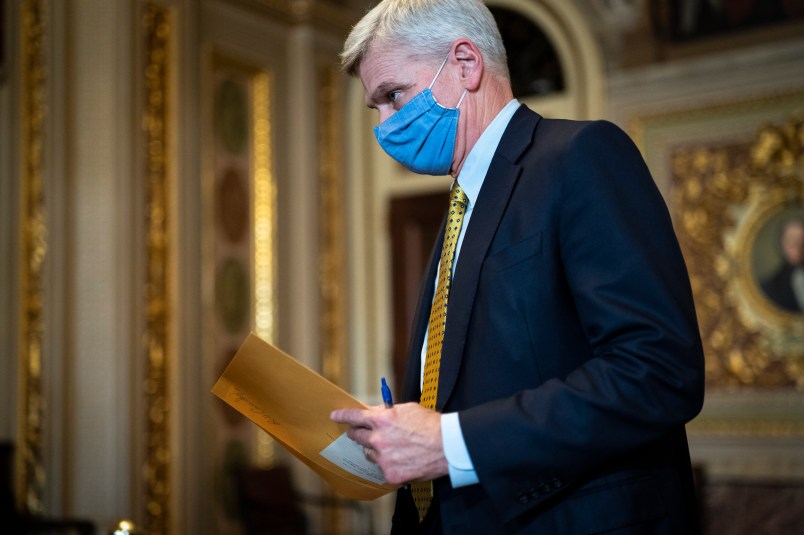Sen. Bill Cassidy (R-LA) did a Fox News interview Sunday where he struggled to identify which specific parts of President Joe Biden’s infrastructure plans he objects to, encapsulating the greater Republican difficulty in campaigning against the legislation.
Fox News host Chris Wallace put up some major planks of the proposals — the American Jobs Plan and American Families Plan — and asked Cassidy which pieces his state didn’t need. The list included $100 billion for workforce development and $225 billion for child care.
“Every one of those programs should be evaluated, and if it’s important, it should be advanced,” Cassidy said. “It’s not infrastructure,” he added, returning to one of the primary Republican talking points in opposition to the plan: that Biden’s “infrastructure” umbrella is a misnomer.
He added that spending on roads and bridges — $115 billion in Biden’s proposal goes to repairing and modernizing roads and bridges — is “so low” and “not gonna get you a road and bridge, and that’s what my state would really like to see.”
Wallace pressed further, pointing out to Cassidy that a full 25 percent of children in Louisiana live in poverty, and that 42 percent of residents there do not have access to child care.
“Forget whether it’s infrastructure or not — wouldn’t they benefit from these government programs?” Wallace asked.
Cassidy then pulled a sharp pivot, saying that he “doesn’t know” if the programs would help, then claiming that teachers unions kept schools closed during the pandemic when the CDC said they could be opened safely.
Cassidy struggles to identify specific planks of Biden’s infrastructure plans that he opposes. pic.twitter.com/2Cj9DvTbbq
— TPM Livewire (@TPMLiveWire) May 3, 2021
He also defended the GOP opposition to altering the tax cuts from former President Donald Trump’s 2017 law. Biden wants to pay for the Families Plan primarily by raising taxes on the wealthy, and for the Jobs Plan by increasing the corporate tax rate.
Cassidy called the 2017 tax cuts a “blue collar working bill,” despite the fact that reports have since shown that the lion’s share of those savings went to businesses and high-income individuals.
Republicans have also, per what preliminary outline of their counter-legislation they’ve released, taken any deficit spending off the table. All they’d allow to pay for the legislation is repurposing “unused federal spending” or possibly a tax on electric vehicle or gas usage.
Cassidy’s verbal contortions are indicative of the persistent Republican problem in speaking out against the proposals. Similarly to their difficulty in getting a foothold against Biden’s COVID-19 relief plan, they’ve struggled to frame their opposition around specific policy complaints beyond arguing about what does and does not qualify as “infrastructure.” They’ve also harkened back to Republicans of yore, characterizing the expense of the package as irresponsible spending.
While the group of GOP moderates — including Cassidy — that took a lap through the networks this weekend insisted that a bipartisan plan can be reached if the White House will only cooperate, they’ve consistently dismissed major planks of the Biden plan as nonstarters. That includes such basic factors as price and scope.
Bipartisan meetings are actively ongoing though, and Biden is reportedly personally involved. Some senators have floated the idea of a bipartisan “roads and bridges” bill that’s smaller and could muster enough GOP support to pass through regular order and circumvent the filibuster. Then, Democrats would bundle their remaining policies, including much of the “human infrastructure” legislation that would dramatically strengthen the social safety net, into another package meant to go through reconciliation and pass on Democratic support alone.
The two parties seem to be fairly far apart even on the scaled-back package, though negotiations are expected to stretch on for at least a few weeks. Biden applauded the GOP effort to craft a counter-proposal during his first joint address to Congress last week, though he also underscored his ultimate priority with the legislation.
“I just want to be clear: From my perspective, doing nothing is not an option,” he said.







Don’t know about you, but I am always quite satisfied when the argument is “just because”…
Framing the debate in such a manner to cause the other side problems
pretty good for a gaff machine in cognitive decline
Translation- I am against it because I am a Republican and Joe Biden is a Democrat.
If dems is fer it, he agin it.
“Whatever it is, I’m against it.”
But without any of Groucho’s wit, intelligence, talent, or class.